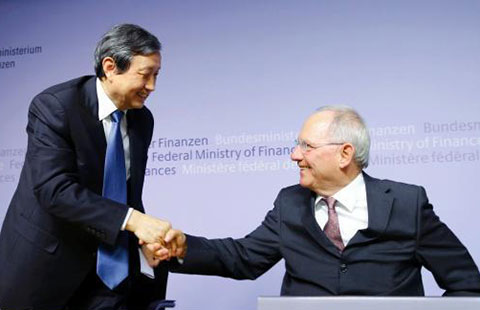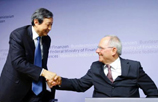UK creative industries bank on China
By Zhang Chunyan (China Daily) Updated: 2015-03-03 06:54
The economy is slowing in China, but Britain's creative industries are positive about the potential of the market in the mainland.
The business sector is aggressively promoting its advantages and seeking to export more to China and explore business cooperation with Chinese partners.
British creative industries believe that Chinese consumers are prepared to wait for top-quality products and Chinese companies need the expertise that British companies can provide.
During a visit to China, Prince William promoted the Great Festival of Creativity, which runs in Shanghai from Monday to Wednesday and showcases more than 500 British companies. On the British side, there are hopes for as much as 150 million pounds ($232.3 million) worth of business and the establishment of lasting bilateral business partnerships.
The demand from Chinese consumers, coupled with the scale of the market, have given British creative industries lots of confidence in their business prospects. Chinese consumers are buying higher-value products and enjoying creative services that will drive the Chinese economy forward. One example of this trend can be found in the entertainment industry.
At the start of 2013, China had about 13,000 film screens and the total grew by about 10 a day. China also has the largest film studios in the world and its box office revenues grew 36 percent in 2014.
British program producers are making inroads already, as Chinese viewers increasingly stream content through local platforms. For example, the BBC's third season of Sherlock received almost 70 million views on digital platform Youku. Chinese viewing figures of 160 million per episode of Downton Abbey are extraordinary.
Chinese companies that seek advanced creative technology offer opportunities for the British creative industry. In recent years, creative and artistic skills have become more valued in China. The sector has been growing at more than 20 percent a year since 2004.
Having largely relied on imports of foreign design and technology for many decades, China has shifted to developing its own creative abilities.
The move from "made in China" to "designed in China" is creating diverse opportunities for British companies.
Expecting 2015 to be another bumper year for creative output, the British creative industries are putting more effort into China.
- Israel requests to join Asian Infrastructure Investment Bank
- Chinese stocks rebound on April 1
- China, the West in Africa: more room for cooperation than competition
- Nanjing cuts taxi franchise fees
- Air China increases flights to Milan, Paris
- JD.com raises delivery charges
- Veteran corporate strategist upbeat about China economy
- L'Oreal China sales revenue up 7.7% in 2014

















